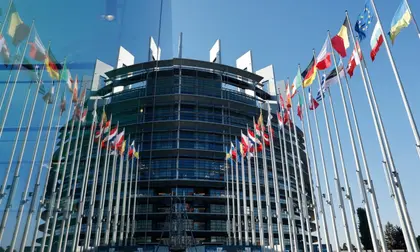In the run-up to the European elections there is growing concern about Kremlin interference, be it through media influence aimed at swaying voters or direct influence on politicians and parties. Commentators look at where the dangers lurk and how they can be countered.
Pro-Russian ideas threatening the EU
JOIN US ON TELEGRAM
Follow our coverage of the war on the @Kyivpost_official.
Le Monde warns of pro-Russian parties in several countries:
“Above all, the conflict being waged on our borders by Russia must prompt a new awareness. ... Just two years ago the Rassemblement National made a military alliance with Russia the spearhead of its defence programme. Today, the FPÖ in Austria and the AfD in Germany openly display their pro-Kremlin sympathies. And while their priorities are not dictated by Russia, their illiberal interests coincide. ... These political parties pose a real threat to the founding principles of the EU and remain - for the most part - the bearers of a dangerous ideological affinity with the Kremlin.”
Don't hold back in the information war
Polityka calls for countermeasures against Russian disinformation:
“EU leaders are aware of the Russian assaults on the foundations of democracy. At a summit in Brussels this week they discussed how to respond to such activities ahead of the elections. European Council President Charles Michel argued: 'We need to be much more vigilant, work together better and show Russia that we are not naive.' For this to be the case - and the Council President did not add this - it is not enough to passively defend ourselves against disinformation. We must actively combat it. Because the information war is won by whoever imposes their narrative first.”

North Korea’s Ballistic Missile with 1,200–3,000 km Range Spotted in Russia
Kremlin cash destroying democracies
Using the example of the US, Svenska Dagbladet explains how Russian money is undermining the political system:
“In the last US elections both parties were financed with hundreds of millions of dollars whose origins were unclear. ... The current Republican speaker, Mike Johnson, received funding from an American company owned by high-ranking Russian businessmen when he was elected to Congress. All of this was judged to be legal. The question is, what does it mean for freedom and the rule of law in the US when there is so much black money in politics? If we cannot identify and control dirty money in politics, it is doubtful that democracy can survive.”
You can also highlight the text and press Ctrl + Enter






